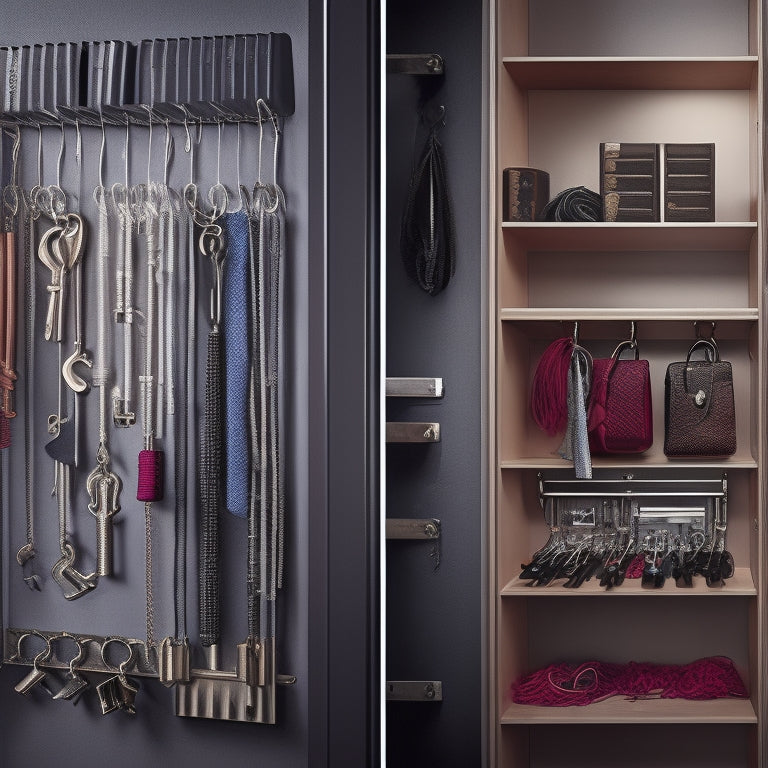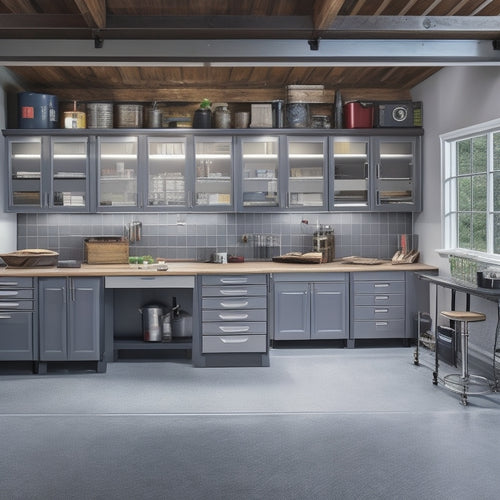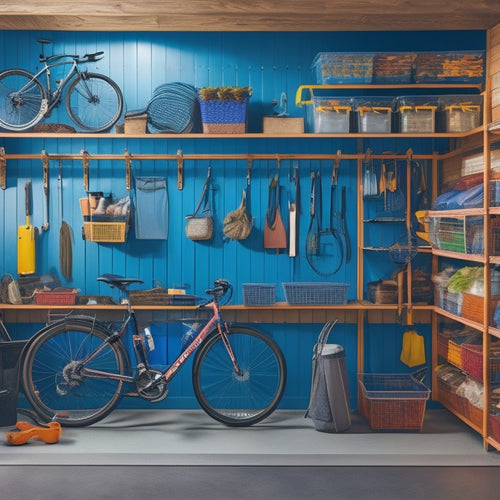
What's the Best Key Storage for Landlords?
Share
As a landlord, you need a reliable key storage solution to efficiently manage your rental properties. A well-organized system enables easy key identification, categorization, and labeling, ensuring quick access and preventing unauthorized use. You can choose from various storage options, including key cabinets, electronic access controls, and space-saving solutions like wall-mounted racks or hidden safes. Consider factors like key capacity, security features, and cost when selecting the best system for your needs. By implementing an effective key storage solution, you'll reduce the risk of lost or misplaced keys, improve inventory control, and enhance overall property management - and there's more to explore.
Key Takeaways
• A well-structured key storage system helps landlords efficiently manage property maintenance, identify keys, and prevent unauthorized access.
• Centralized key storage solutions provide quick key retrieval, improved key safety, and reduced likelihood of lost or misplaced keys.
• Electronic key storage solutions offer advanced security features, flexibility, and scalability, while mechanical solutions are more affordable upfront.
• Key tracking and management systems enable landlords to maintain a clear overview of property access, monitor key usage, and manage key inventory efficiently.
• Space-saving key storage solutions like wall-mounted key racks, hidden key safes, and portable key lockboxes provide organized and secure key management options.
Key Organization for Rental Properties
When managing multiple rental properties, you'll quickly realize that keeping track of numerous keys can become a logistical nightmare, making a key organization system essential for efficient property maintenance and timely renter access.
A well-structured key organization system ensures that you can easily identify and locate specific keys, reducing the likelihood of lost or misplaced keys. This, in turn, saves you time and effort, allowing you to focus on more critical aspects of property management.
As a landlord, it's vital to implement a key management system that caters to your unique needs. You can start by categorizing keys by property type, location, or renter. Labeling each key with a unique identifier or color-coding them can also help streamline your key organization process.
Utilizing landlord tools, such as key tracking software or physical key storage solutions, can further enhance your key management capabilities. By investing time and effort into developing an effective key organization system, you'll be better equipped to manage your rental properties, providing timely access to renters while maintaining the integrity of your properties.
Benefits of Centralized Key Storage
As a landlord, you're likely no stranger to the frustration of misplaced keys or wasted time searching for the right one. By implementing a centralized key storage system, you'll enjoy easy key access whenever you need it, and lessen the risk of key loss.
With a centralized system, you'll be able to quickly locate the keys you need, saving you time and hassle in the long run.
Easy Key Access
By implementing a centralized key storage system, you can enjoy the convenience of easy key access, eliminating the hassle of searching for misplaced keys or waiting for someone to arrive with a spare. This streamlined approach to key management allows you to quickly retrieve keys when needed, ensuring that maintenance, repairs, and showings can be scheduled without delay.
With easy key access, you can also improve key safety by minimizing the risk of unauthorized key duplication or misuse. By keeping keys in a secure, tamper-evident environment, you can prevent unauthorized access to your properties and protect your tenants' security deposits.
A centralized key storage system also enables you to track key usage and monitor who's accessed which keys, providing an added layer of accountability and transparency. This feature is particularly useful for landlords who manage multiple properties or have a large team of maintenance personnel.
Reduced Key Loss
Centralizing your key storage greatly reduces the likelihood of lost or misplaced keys, freeing up your time to focus on more pressing property management concerns. This is especially important when you have multiple properties to manage, and losing track of keys can lead to costly delays and inconveniences. With a centralized key storage system, you can easily keep track of who has which keys and when they were last accessed.
| Benefits of Centralized Key Storage | Description |
|---|---|
| Reduced Key Loss | Minimize the risk of lost or misplaced keys |
| Improved Key Tracking | Easily monitor who has which keys and when |
| Enhanced Inventory Control | Keep a accurate record of all keys in your system |
| Increased Efficiency | Save time and reduce the hassle of key management |
| Better Security | Limit access to authorized personnel only |
Choosing the Right Key Cabinet
You'll want to take into account the number of keys you need to store when selecting a key cabinet, as this will help determine the ideal size and type of cabinet for your specific needs. A key cabinet that's too small can lead to clutter and disorganization, while one that's too large can be a waste of space. Consider the following factors to make sure you choose a cabinet that meets your key management needs:
-
Key capacity: How many keys do you need to store? Make certain the cabinet can hold all your keys, with some extra space for future additions.
-
Key organization: Do you need separate compartments or hooks for each key? Consider a cabinet with customizable dividers or key tags for easy identification.
-
Accessibility: Where will you place the key cabinet? Choose a location that's convenient for you and your staff, but still secure.
- Style and design: Will the cabinet fit with your office decor? Select a cabinet that's not only functional but also visually appealing.
Key Security and Access Control
As a landlord, you understand the importance of controlling who has access to your properties.
You're now considering key security and access control measures to guarantee that only authorized individuals can enter your rental units.
You'll want to explore secure key storage options and electronic access controls that can help you manage access and minimize the risk of unauthorized entry.
Secure Key Storage Options
When managing multiple properties, effective key storage becomes crucial to maintaining the security and integrity of your rental units. Implementing secure key storage options is essential to preventing unauthorized access and potential liabilities. You can't afford to compromise on the safety of your tenants and properties.
Here are some secure key storage options you should consider:
-
Smart Lockboxes: These digital lockboxes can be accessed using a unique code or biometric authentication, ensuring that only authorized individuals can retrieve keys.
-
Key Safes: These tamper-proof containers can be mounted to a wall or fixed to a solid object, providing a secure location to store spare keys.
-
Key Cabinets: These locked cabinets can be installed in a secure location, such as a management office, to store and organize multiple keys.
- Locked Key Racks: These racks can be mounted to a wall and locked to prevent unauthorized access to keys.
Electronic Access Controls
Implement electronic access controls to take your key security and access control to the next level, allowing you to efficiently manage and monitor who's access to your properties.
With electronic access controls, you can grant access to tenants, contractors, or maintenance personnel without having to physically hand over keys. This means you can control who enters your properties, when, and for how long.
Remote access control enables you to manage access from anywhere, at any time. You can grant or revoke access permissions instantly, ensuring that only authorized individuals can enter your properties.
Keyless entry systems eliminate the need for physical keys, reducing the risk of lost or stolen keys. Smart locks can be integrated with digital key storage systems, allowing you to store and manage digital keys securely.
Electronic Vs Mechanical Key Storage
Managing access to your properties efficiently requires weighing the trade-offs between electronic and mechanical key storage solutions, each with its unique benefits and drawbacks. When it comes to key security, you'll want to evaluate the pros and cons of each option carefully.
Electronic key storage solutions, such as digital key safes, offer advanced security features like biometric authentication and audit trails. On the other hand, mechanical key storage solutions, like traditional key cabinets, provide a more straightforward and cost-effective approach to key management.
Here are some key differences to take into account:
-
Accessibility: Electronic solutions can be accessed remotely, while mechanical solutions require physical presence.
-
Security: Electronic solutions often have advanced security features, while mechanical solutions rely on physical barriers.
-
Cost: Mechanical solutions tend to be more affordable upfront, while electronic solutions may require ongoing subscription fees.
- Scalability: Electronic solutions can be easily scaled up or down, while mechanical solutions may become cumbersome with large numbers of keys.
Ultimately, the best choice for you'll depend on your specific needs and priorities. By carefully weighing the trade-offs between electronic and mechanical key storage solutions, you can ensure that you're providing the highest level of key security and management for your properties.
Key Storage for Multiple Properties
As you expand your property portfolio, you're likely to face the challenge of keeping track of keys across multiple locations, making it necessary to adopt a key storage strategy that can efficiently handle a large volume of keys. This is especially important when managing multiple properties, as lost or misplaced keys can lead to costly delays and inconvenience for your tenants.
To streamline key management, consider implementing a centralized key storage system that can be accessed remotely. This can be achieved through the use of smart locks, which offer keyless entry and can be controlled digitally. With smart locks, you can grant access to specific individuals or teams, and monitor key usage in real-time.
Here's a comparison of traditional key storage methods vs. smart lock technology:
| Traditional Key Storage | Smart Lock Technology |
|---|---|
| Physical keys must be stored in a secure location | Digital keys are stored in the cloud, reducing physical storage needs |
| Keys can be lost or misplaced | Digital keys can be revoked or updated remotely |
| Limited access control and monitoring capabilities | Real-time monitoring and access control capabilities |
Key Tracking and Management Systems
Your key tracking and management system should be designed to provide a clear overview of who's access to each property, when they accessed it, and for how long. This is vital in maintaining the security and integrity of your properties. A well-organized system allows you to efficiently manage your key inventory, ensuring that you always know who's a key and when it was issued.
Here are some essential features to keep in mind:
-
Key assignment: A record of who's been allocated a key, including contractors, tenants, and maintenance staff.
-
Key issue and return: A log of when keys are distributed and brought back, including dates and times.
-
Key status: A system to monitor the status of each key, such as 'issued,' 'returned,' or 'lost.'
- Access history: A record of when each property was entered, including the date, time, and person who accessed it.
Space-Saving Key Storage Solutions
You need a key storage system that can efficiently hold a large number of keys without taking up too much valuable space, allowing you to keep your properties' keys organized and within easy reach. As a landlord, you understand the importance of maximizing space while maintaining accessibility. That's where space-saving key storage solutions come in.
Wall-mounted key racks are a great option, providing a tidy and organized way to store your keys. Hidden key safes are another excellent choice, offering an added layer of security by concealing your keys from prying eyes. These solutions are perfect for small areas, such as hallways or closets, where every inch counts.
If you need to store keys on-the-go, consider portable key lockboxes or magnetic key holders. These compact solutions allow you to securely store and transport your keys, making it easy to manage multiple properties.
Frequently Asked Questions
Can I Use a Key Storage System for Airbnb or Short-Term Rentals?
'Did you know 80% of Airbnb guests prefer self-checkin? You can use a key storage system for short-term rentals, offering remote access and excellent security while being user-friendly and customizable to fit your unique hosting needs.'
How Do I Prevent Unauthorized Key Duplication or Copying?
To prevent unauthorized key duplication or copying, you'll want to implement key control and security measures, such as restricted access and tracking systems, to monitor tenant access and guarantee only authorized individuals can obtain keys.
Are Key Storage Systems Suitable for Outdoor or Harsh Environments?
When selecting a key storage system, you'll want to contemplate outdoor durability and weather resistance if you plan to install it outside. Look for systems with IP-rated enclosures, rust-resistant materials, and tamper-evident features to guarantee secure key storage.
Can I Integrate Key Storage With Existing Property Management Software?
"When you're trying to get all your ducks in a row, integrating key storage with your existing property management software is a no-brainer, allowing you to streamline operations, boost efficiency, and simplify your workflow."
Do Key Storage Systems Comply With Fire Safety and Emergency Access Regulations?
You'll want to guarantee that the key storage system you choose complies with fire safety regulations and emergency access requirements, providing swift access for first responders while maintaining secure key management and minimizing liability risks.
Related Posts
-

Best Tool Chests for Home Garage Options
When selecting the best tool chest for your home garage, you'll want to evaluate top brands like DeWalt, Milwaukee, a...
-

Best Materials for Garage Wall-Mounted Cabinets
When selecting materials for your garage wall-mounted cabinets, you'll want to evaluate options that balance durabili...
-

Garage Wall Storage Ideas to Boost Productivity
You can enhance your garage's productivity by capitalizing on your ceiling height with overhead racks, storing bulky ...


